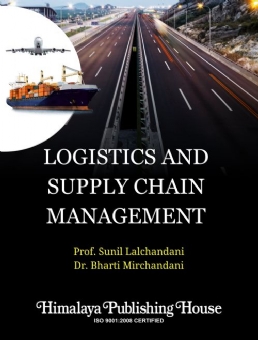Logistics as a business concept evolved in the 1950s with the increasing complexity of supplying businesses with materials and shipping out products in an increasingly globalized supply chain. Today, the business sector uses this term to describe the efficient flow and storage of goods from point of origin to the point of consumption. The supply chain is a vital part of this process, including transportation, shipping, receiving, storage, and management of all these areas. Within the business sector, logistics can be applied to information, transportation, inventory, warehousing, materials handling, and packaging, disposal, and security. Logistics is one of the main functions within a company, and the supply chain is a complex and sometime fragile global endeavor dependent on a network of independent, yet interconnected, moving parts.
This book, which has been written in line with the revised syllabus of T.Y. BMS of Mumbai University, is an attempt to provide the basic knowledge to the learners about the Logistics and Supply Chain Management.
The book is unique in its presentation and style. Authors have tried to present the matter in as clear and simple manner as possible to make it intelligible to each and every student.
Contents –
1. Introduction to Logistics Management
2. Introduction to Supply Chain Management
3. Customer Service: Key Element of Logistics
4. Demand Forecasting
5. Transportation
6. Warehousing
7. Material Handling
8. Packaging
9. Inventory Management
10. Logistical Costing
11. Performance Measurement in Supply Chain
12. Logistical Network Analysis
13. Information Technology in Logistics
14. Modern Logistics Infrastructure
15. Logistics Outsourcing
16. Logistics in Global Environment
Model Question Paper







